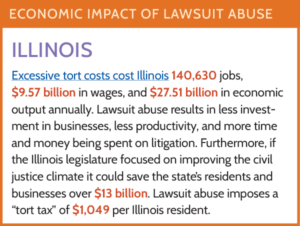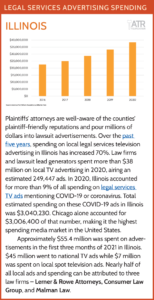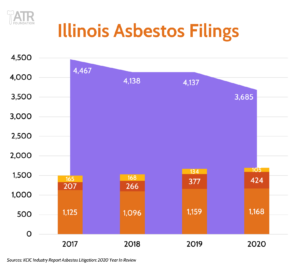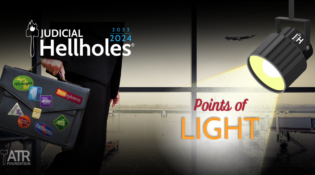LEGISLATURE PURSUES TRIAL BAR AGENDA
The powerful Illinois trial bar flexed its muscles during the 2021 legislative session, pushing the legislature to pursue its liability-expanding agenda. Sympathetic legislators used a variety of questionable tactics to successfully pass priority bills, including late-night amendments and last-minute substitutions.
Illinois S.B. 72, the Prejudgment Interest Act, was enacted in May 2021 and took effect on July 1. Prior to this act, Illinois did not provide prejudgment interest on damages for personal injury or wrongful death. Under the new law, prejudgment interest begins to accrue the day the action is filed at a rate of 6% annually. As a result, parties named in a lawsuit will have to weigh the increased risk of defending them- selves in court because, while the case is litigated, the potential award is rising.
This bill was presented as a “compromise” by its proponents after Governor J.B. Pritzker (D) vetoed the initial version, H.B. 3360, which called for a rate of 9%. This bill was set to die, but at the 11th hour, Senate President Don Harmon introduced a loaded amendment. It passed the House a few days later on January 13 around 3 a.m. While H.B. 3360 originally dealt with mortgages, the unrelated amendment created a law with far-reaching implications for the state’s civil justice system.
It is small businesses and their employees who will ultimately pay the price when astronomical litigation costs force businesses to raise prices across the board, simply to keep up. In turn, this will increase the “tort tax” burden on consumers, while simultaneously increasing payouts for trial lawyers. It opens defendants in civil cases to unnecessary financial exposure, and at a time when many businesses across the state already are struggling.
Another midnight-surprise passed by the Illinois Legislature is S.B. 2406. The bill, which will break up the state’s 20th Judicial Circuit Court, passed in the middle of the night on the last day of the legislative session without a public hearing. Proponents of the bill claimed that its purpose was to address a heavy caseload coming from the St. Clair County courthouse, but the real purpose seems to be to protect one of America’s premier personal injury destinations. A perennial Judicial Hellhole®, St. Clair County has long been infamous as a magnet for asbestos, class actions and no-injury lawsuits thanks to its plaintiff-friendly judiciary. The rest of the circuit surrounding St. Clair County has been trending away from the plaintiff- friendly approach, recognizing a need to protect local businesses from frivolous lawsuits. Because of St. Clair County’s lucrative history for the trial bar, the plaintiff-friendly legislature couldn’t risk letting the county become less attractive for lawsuits that fill the pockets of trial lawyers.
In addition to breaking up the 20th Judicial Circuit Court, the Democrat-controlled legislature also redrew the supreme court districts for the first time since 1964, with a party-line vote. Illinois’ seven Supreme Court justices are elected by five Supreme Court districts. Cook County elects three of the justices, while the other four districts each elect one justice.
While proponents in the legislature say the decision to redraw the map was in response to population changes, critics argue it is a ploy to keep the status quo in the state’s high court. This became a concern following Justice Thomas Kilbride’s unsuccessful retention campaign in 2020, making him the first state Supreme Court justice to lose a retention vote in Illinois history. The new map shrinks the Third District, Kilbride’s former district.
Long-time Legislative Champion for Trial Bar Steps Down
In February 2021, former Illinois Speaker of the House Michael Madigan stepped down from his legislative seat in the face of a federal investigation of political corruption. U.S. Attorney John Lausch charged ComEd, a utility company, with bribery for attempting to influence an unnamed Illinois legislator, fitting Madigan’s description, through the provision of “financial benefits.” The bribery scheme allegedly began in 2011 and lasted through 2019. Prosecutors estimate at least $150 million in “anticipated” legislative benefits were conferred. As part of a deferred prosecution agreement, ComEd has agreed to pay a $200 million fine. While Madigan has not been charged and has denied wrongdoing, he has been implicated as “Public Official A” in documents outlining the bribery scheme.
Madigan has raked in hundreds of thousands of dollars in campaign contributions over the years from the Illinois Trial Lawyers Association PAC and served as an effective roadblock to civil justice reforms. While his departure deals a blow to the plaintiffs’ bar, the new Speaker of the House, Emanuel “Chris” Welch, is a longtime Madigan ally who will likely continue to push plaintiff-friendly legislation.
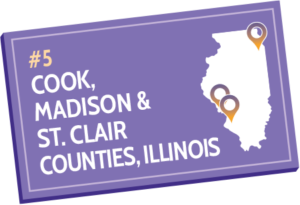 This trio of Illinois counties is a magnet for asbestos litigation and “no-injury” lawsuits stemming from the state’s Biometric Information Privacy Act. Making matters worse, the Illinois General Assembly is one of the most plaintiff-friendly legislatures in the country and Governor J.B. Pritzker (D) supports a liability-expanding agenda to the detriment of Illinois citizens.
This trio of Illinois counties is a magnet for asbestos litigation and “no-injury” lawsuits stemming from the state’s Biometric Information Privacy Act. Making matters worse, the Illinois General Assembly is one of the most plaintiff-friendly legislatures in the country and Governor J.B. Pritzker (D) supports a liability-expanding agenda to the detriment of Illinois citizens.